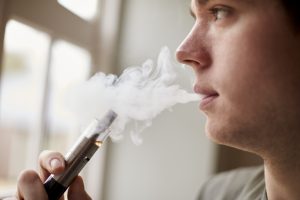
Ex-smokers, on the other hand, demonstrate a reduced risk of hearing loss. This trend may be explained by the fact that smoking cessation often comes along with introduction of other healthy lifestyle habits.
There are many methods to help you quit smoking, like hypnosis, nicotine patches, therapy, and other prescribed medications, but recently more and more people seem to be opting for vaping – smoking e-cigarettes, basically – as a way to quit.
E-cigarettes, or vapes, electronically heat up a flavored liquid to create vapor, which is inhaled by the smoker. Many users have praised the product as an effective means to quit smoking, despite the numerous health concerns associated with it. The latest findings point to the potential harm to one’s hearing resulting from vaping.
Can e-cigarettes cause hearing loss?
Recently, a popular DJ came out about his hearing loss, attributing it to e-cigarettes. Of course, if you hear a DJ is suffering from the loss of hearing, you would assume it is due to wearing headphones and playing loud music in large stadiums. But in this situation, and to many people’s surprise, e-cigarettes were to blame. This story demonstrates that the impact of e-cigarettes is not fully understood yet and that vaping may not be as harmless as people often assume.
The flavored liquid, also known as e-liquid or juice, contains propylene glycol, known to be indirectly toxic to the auditory system and commonly found in products like shampoo. However, the effects of inhaled propylene glycol are unknown.
Previously, propylene glycol was found to create inflammation in the middle ear mucosa to mimic cholesteatoma – a destructive expanding growth in the middle ear – in animals. Based on this, it was concluded that propylene glycol can negatively impact hearing.
Some studies even alluded to the damage caused to the strial cells (which promote hearing by helping blood circulate in the ear). When these cells die due to toxins and insufficient supply of oxygenated blood, sudden hearing loss may take place.
Other side effects of e-cigarettes
Aside from hearing loss, additional side effects and consequences come to light as more and more research studies look at health effects of vaping. Just like regular tobacco cigarettes, e-cigarettes still pose a threat to health. They do contain nicotine, as well as their own unique slew of chemicals that allow the vaping juice to taste and smell good.
In fact, many e-cigarettes contain the same amount of chemicals as traditional cigarettes, but the concentration can be much greater. With the same toxins present in both regular tobacco cigarettes and vapes, the smokers still face an increased risk of cancer. Additionally, many people pass around and trade their e-cigarettes to try different flavors, spreading illnesses.
Smoking, be it traditional or new-age vaping, can affect your heart as well. Smoking impacts blood flow and can lead to hardening of the arteries –atherosclerosis – according to research conducted by Brown University.
Clearly, e-cigarettes are just as harmful as traditional tobacco, and they impact all major aspects of your health, hearing included. If you are looking to quit smoking, speak with a doctor who can help you find a plan for success.